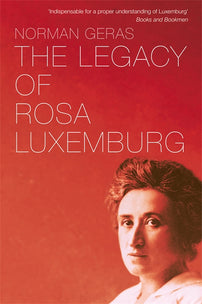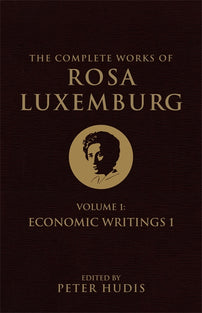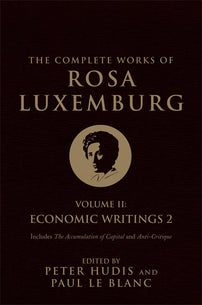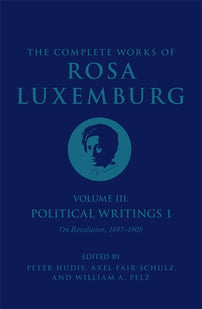In Memory of Rosa Luxemburg and Karl Liebknecht
Paul Levi remembers the murdered German Communists.

It is ten years now since the following events. On a gloomy January day I was arrested by some uniformed men – ‘carrying out orders’ – and taken first to the Reichstag building and then to the Moabit remand prison. I remained there for a few days. I repeatedly asked for my watch, and was told I would get it. One evening, it was dark and terribly cold in the cell, an inspector came to talk to me. I didn’t know what the man was after; he spoke as if he just wanted to know whether I was still prepared to answer. He told me not to worry, I was safe in the Moabit prison. I didn’t know what he wanted; outside, a uniformed guard with a gun was marching up and down the wing. Finally, I asked him how it was going with my watch. He said I would get it the next day.
At around eleven in the morning, I was led into the office to receive my watch. On the counter were newspapers with the headline in bold type, ‘Karl Liebknecht and Rosa Luxemburg Slain by the Crowd’. That was the way the bandits announced the event, the form in which I learned the news. There are minutes that weigh the same as a long life: the two minutes after reading these lines were such minutes.
***
Anyone at that time with even a vague idea of things had to recognise that this murder had a historical significance comparable, say, with the murder of the two Gracchi. At the head of a brief and abrupt popular movement, these two, Karl Liebknecht and Rosa Luxemburg, had stepped into the sharp light of world history; in comparison with their few weeks at the head of the ‘Spartakus movement’, all the rest of their influence would be forgotten. Rosa Luxemburg, the brilliant orator, the inspired writer, the deep researcher and thinker, an all-round human being who loved animals and plants, would disappear behind the light of these few weeks, just as Karl Liebknecht would only be born to history in December 1914, when he voted against the war credits and publicly declared his support for the ideas he received from Rosa Luxemburg. So much life and so much achievement would disappear behind the story of a ‘street uprising’ of a few weeks, and for a reason: like the revolt of the Gracchi, like the Cataline uprising, the Spartakus movement was the cry of lamentation of a violated humanity. In its unruliness and immediacy, but also in the depth of its feeling, it was a most passionate reaction against the crime of the war; and with the passion of accusation it combined the eager will for socialism. In this passion and this will, its revolutionary action produced the highest achievement so far of the German working class. This fame will remain with the Spartakus movement whatever the hostile talk; even if an emotional minister’s wife whines today in the Vossische Zeitung about how one night she had to fear for her husband because of Spartakus. The poor woman forgets only one thing: there were women in ‘Spartakus’ who had to fear for their husbands not for one night but for four years.
The weakness of the Spartakus movement, as everyone can see today, was that it allowed itself to be pushed into a street uprising. This was already seen at the time by Rosa Luxemburg and Leo Jogiches. The fact that it happened none the less was due to a material and a personal weakness. The material weakness lay in the lack of any organisation. In the speeches of that time, and also in some views today, ‘Spartakus’ were portrayed as snipers, as looters, as mutineers hired for 10 marks a day, with Russian money, of course; how unimaginative the German men of order are, that at the end of their four-year disaster they come back to the Russian money they had begun with in 1914. In reality, this was a small propaganda group, led by the head of Rosa Luxemburg and held together by the will of Leo Jogiches, with no other weapon during the war than leaflets, and pursued by a crowd of criminal investigators, a Reich prosecutor and a Reich judicial committee. But how rapidly a small group can in certain circumstances expand its influence! In the strike of January 1918, responsibility for which Ebert rejected as an insult, the group rapidly gained importance through its leaflets. Added to this was the Liebknecht name. No one during the war understood better than the Frenchman, Henri Barbusse, how one man, a single man, publicly stood up against the slaughter. All this, grouped around the idea of socialism, was the aura of Spartakus. What it lacked was organisation. And so this aura became damaging for Spartakus. For moths of every kind were attracted to this flame. When all the wild-eyed philistines in Germany, so-called anarchists, converged on the founding congress of the Communist Party and, against the clear insight of Rosa Luxemburg and Leo Jogiches, voted the nascent party into misfortune, Jogiches immediately wanted to ‘tear up the whole business’. He was right. Because nothing so distorted the real face of Spartakus as the radical big-mouths who converged on it at that time. By the way, they have all gone quiet in the meantime and shut their mouths again. But Rosa Luxemburg, Leo Jogiches and Karl Liebknecht are dead.
Spartakus also had a personal weakness. Karl Liebknecht did not recognise how Spartakus was being led astray by the anarchists, pushed from the right. None of those present will forget the scene when Rosa Luxemburg held up to Karl Liebknecht the document signed by ‘the provisional government, Ledebour, Liebknecht, Scholze’. She simply asked him: ‘Karl, is this our programme?’ The rest was silence.
***
All this is also the reason why the visible traces of the Spartakus movement have remained few. There is a Communist party in Germany today; it claims connection with the work of Rosa Luxemburg. But this has not prevented, for example, one of the many leaders of this party, male and female – who have come, who have been, who have gone – being able to dump, so to speak, on Rosa Luxemburg’s grave, to the cheering acclaim of the crowd. What Rosa Luxemburg wrote about the Russian revolution in 1918, and has become such a cruel and painful truth, was the bitterest criticism of a Communist party that uncritically babbles ‘Russia’. It cannot be said that the ideas of the Communist Party are opposed to those of Rosa Luxemburg. The party simply lost those ideas and failed to gain any new ones. Thus, after ten years, the names of Rosa Luxemburg and Karl Liebknecht need to be cleansed of the dirt that ‘their’ party hung on them. These friends are trying to desecrate their names; they will not succeed. For by giving them the death of martyrs, the enemies of Rosa Luxemburg, Leo Jogiches and Karl Liebknecht raised their names to the stars. ‘But those whom we mourn will remain alive in the hearts and mouths of all. Their names will be inscribed on the great altar that a free humanity will one day build for its heroes.’
From: Der Klassenkampf. Sozialistische Politik und Wirtschaft, vol. 3, no. 2, 15 January 1929.
Translated by David Fernbach
[book-strip index="1" style="display"]



